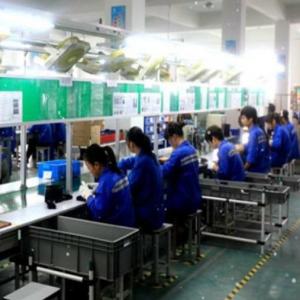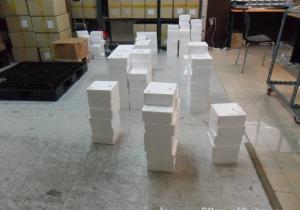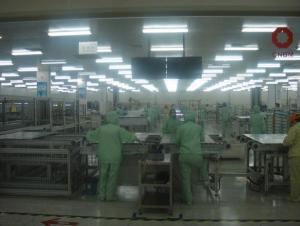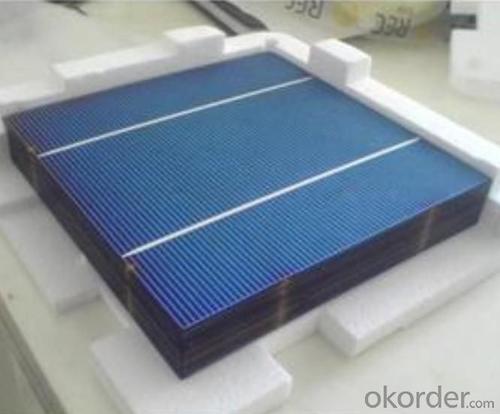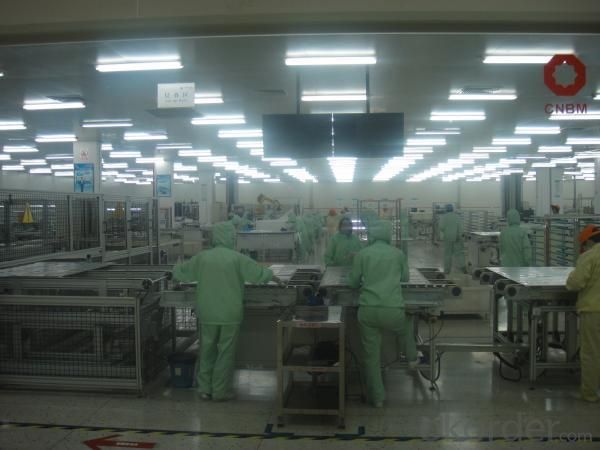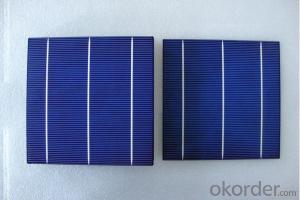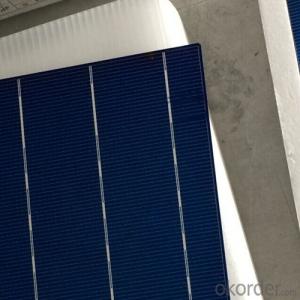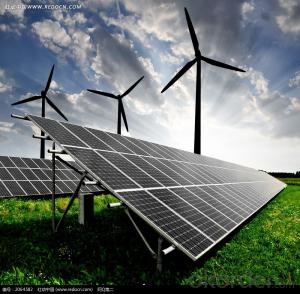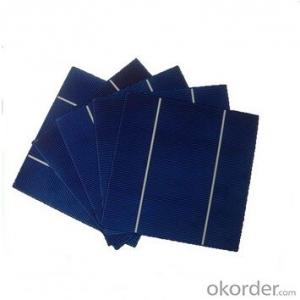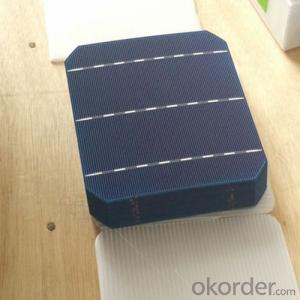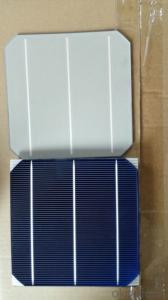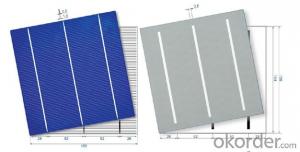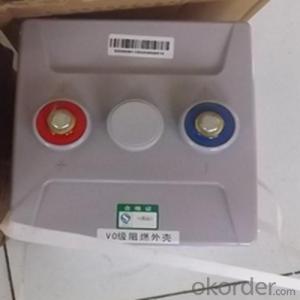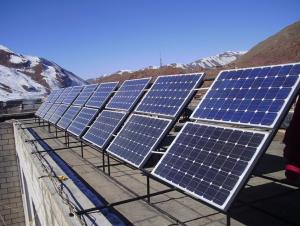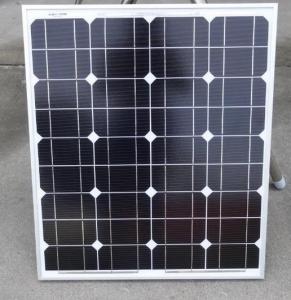Sun Power Solar Cells - High Quality Poly Solar Cell 156mm with TUV, CE Certification
- Loading Port:
- Tianjin
- Payment Terms:
- TT or LC
- Min Order Qty:
- 40000 watt
- Supply Capability:
- 1000 watt/month
OKorder Service Pledge
OKorder Financial Service
You Might Also Like
Details Of Poly Solar Cell 156mm
Specifications Of Poly Solar Cell 156mm
1.Mechanical data and design
Format | 156 mm × 156 mm ± 0.5 mm |
Thickness | 210 μm ± 40 μm |
Front(-) | 1.5mm bus bars (silver),blue anti-reflection coating (silicon nitride) |
Back (+) | 2.5 mm wide soldering pads (silver) back surface field (aluminium) |
2.Temperature Coefficient of Cells
Voc. Temp . coef.%/K | -0.351%/K |
Isc . Temp . coef.%/K | +0.035%/K |
Pm. Temp. coef.%/K | -0.47%/K |
3.Electrical Characteristic
Efficiency (%) | Pmpp (W) | Umpp (V) | Impp (A) | Uoc (V) | Isc (A) | FF (%) |
17.25 | 4.197 | 0.524 | 7.992 | 0.62 | 8.458 | 80.03% |
17 | 4.137 | 0.524 | 7.876 | 0.619 | 8.353 | 80.01% |
16.75 | 4.076 | 0.522 | 7.81 | 0.617 | 8.286 | 79.73% |
16.5 | 4.015 | 0.518 | 7.746 | 0.613 | 8.215 | 79.73 |
16.25 | 3.955 | 0.515 | 7.683 | 0.61 | 8.144 | 79.61% |
16 | 3.894 | 0.512 | 7.613 | 0.608 | 8.075 | 79.31% |
15.75 | 3.833 | 0.51 | 7.534 | 0.605 | 8.058 | 78.62% |
15.5 | 3.772 | 0.508 | 7.453 | 0.604 | 8.02 | 77.87% |
15.25 | 3.771 | 0.505 | 7.35 | 0.604 | 9.997 | 76.83% |
15 | 3.65 | 0.503 | 7.271 | 0.604 | 7.989 | 75.64% |
14.5 | 3.529 | 0.499 | 7.067 | 0.604 | 7.988 | 73.14% |
14 | 3.407 | 0.499 | 6.833 | 0.604 | 7.833 | 72.01% |
4.Intensity Dependence
Intensity [W/m2] | Isc× [mA] | Voc× [mV] |
1000 | 1.00 | 1.000 |
900 | 0.90 | 0.989 |
500 | 0.50 | 0.963 |
300 | 0.30 | 0.939 |
200 | 0.20 | 0.920 |
Advantage Of Poly Solar Cell 156mm
1: High quality cell, Level A cell (14%—17.5%)
2.Dimensione:156*156mm Diagonal:200mm
3: Qualified certification: TUV,CE certification.
4: Warranty: five years for whole unit
Usage/Application Of Poly Solar Cell 156mm
Packaging & Delivery Of Poly Solar Cell 156mm | |
Packaging Detai | Packaging Detail:Export Carton and Pallet or under customer request. |
Delivery Detail:10-20days | |
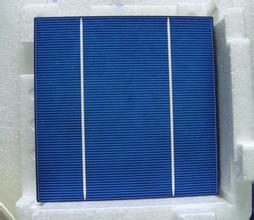
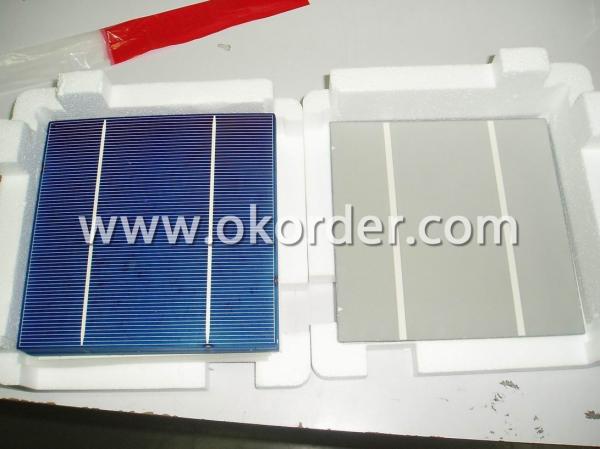
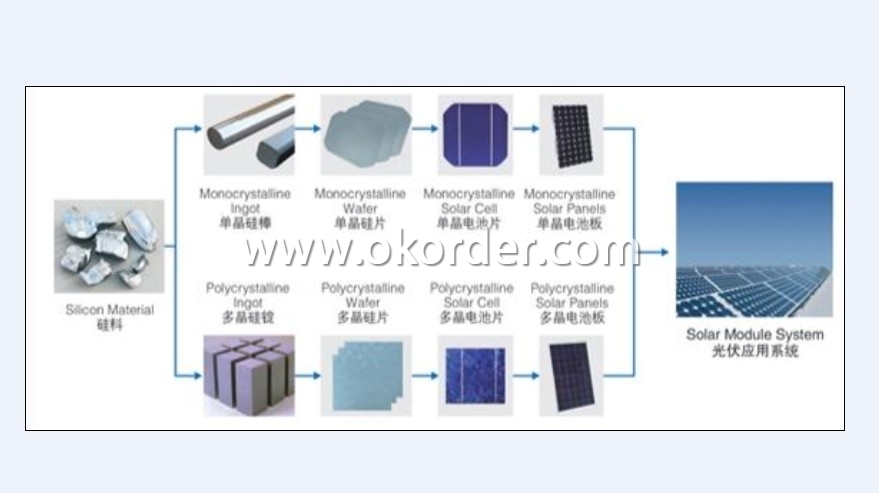
Latest research progress of Polymer Solar Cells
Compared with mature inorganic silicon solar cells from its conversion efficiency and stability, Polymer Solar Cells is still in the development stage. However, due to the advantages of having a light weight, low cost, flexible devices can be made, and a wet film formation (spin coating, ink jet printing and screen printing) technology and other large area, the organic polymer solar cells become one of the hottest areas of research.
Photoelectric conversion efficiency of solar cells is determined by the open-circuit voltage of the battery, short-circuit current, and fill factor, so how to improve the aforementioned three factors, the conversion efficiency of solar cells is a key factor in increasing.
A joint research team from the University of California and the University of Cambridge consisting proposed PIPCP in recent journal Advanced Materials: PC61BM conjugated polymer ─ fullerene heterojunction solar cells latest research body, proposed a lifting battery open circuit voltage the method can significantly improve the photoelectric conversion efficiency of the device.
The paper pointed out that when the organic material absorbed photon excited state is formed, the excited state is seen as the static electricity in a combination of electrons and holes, known as excitons. Since the exciton properties of the organic semiconductor, the driving force of the charge separation in a solar cell is the donor and acceptor materials, the energy difference. Electronic circuit voltage depends on solar photovoltaic bandgap and bandgap is the recipient of the lowest unoccupied molecular orbital (LUMO) and to the body between the highest occupied molecular orbital (HOMO) energy difference.
Receptor lowest unoccupied molecular orbital wave function of the body and to the highest occupied molecular orbital overlap between the interface can create a form, this interface morphology and related electronic open-circuit voltage, called the charge transfer state (CTS). In fixed offsets, energy and electronic charge transfer state open circuit voltage linear relationship, even with the temperature close to the same value obtained when 0K, which shows the energy charge transfer state may limit the open circuit voltage of the electron. By reducing energy loss in the electronic band gap to the open circuit voltage, can effectively enhance the photoelectric conversion efficiency of the organic polymer solar cell.
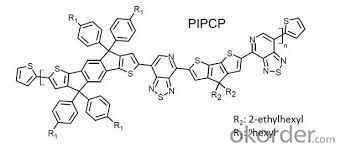
- Q: Can solar cells be used in remote areas with no grid access?
- Yes, solar cells can be used in remote areas with no grid access. Solar cells, also known as photovoltaic cells, convert sunlight into electricity. As long as there is sunlight available, solar cells can generate electricity, making them a viable and sustainable solution for remote areas without access to the grid. These areas can benefit from solar power to meet their energy needs, power appliances, and even provide electricity for basic services like lighting, communication, and water pumping.
- Q: Are solar cells affected by temperature?
- Yes, solar cells are affected by temperature. High temperatures can cause a decrease in the efficiency of solar cells, resulting in a reduction in their power output. However, modern solar cell technologies have been developed to minimize the impact of temperature on their performance.
- Q: What is the most common type of solar cell?
- The most common type of solar cell is the silicon-based solar cell.
- Q: What is the effect of shading on solar cell performance?
- The effect of shading on solar cell performance is significant as shading can reduce the overall power output of the solar panels. When even a small portion of the solar cell is shaded, it creates a "hot spot" effect, leading to increased resistance and reduced electrical current. This can result in a notable decrease in energy production, impacting the overall efficiency and performance of the solar cell system.
- Q: Can solar cells be used to power medical devices?
- Yes, solar cells can be used to power medical devices. Solar cells, also known as photovoltaic cells, convert sunlight into electricity. This renewable energy source can be harnessed to power various medical devices such as portable glucose monitors, prosthetics, hearing aids, and even small medical implants. Using solar cells to power medical devices offers a sustainable and convenient solution, especially in remote areas or during emergencies where access to electricity may be limited.
- Q: What is the impact of saltwater exposure on solar cell efficiency?
- Saltwater exposure can have a significant negative impact on solar cell efficiency. The saltwater can corrode the metal components of the solar cells, leading to a decrease in their performance and overall efficiency. Additionally, the saltwater can create a conductive pathway that can bypass the solar cells, resulting in a loss of electrical energy. Therefore, it is crucial to protect solar cells from saltwater exposure to maintain their efficiency and prolong their lifespan.
- Q: Can solar cells be used in remote communication systems?
- Yes, solar cells can be used in remote communication systems. Solar cells are an efficient and reliable source of renewable energy that can power various remote communication devices such as satellites, weather stations, and remote sensors. Their ability to convert sunlight into electricity makes them ideal for remote locations where access to grid power is limited or non-existent. Additionally, advancements in solar cell technology have made them more compact, durable, and efficient, further enhancing their suitability for remote communication systems.
- Q: Can solar cells be used for powering electric gates?
- Yes, solar cells can be used to power electric gates. Solar panels convert sunlight into electricity, which can be used to charge a battery or directly power the gate's motor. This allows the gate to operate without relying on the traditional power grid, making it more environmentally friendly and cost-effective in the long run.
- Q: Can solar cells be used to power homes?
- Yes, solar cells can be used to power homes. Solar panels, made up of multiple solar cells, can convert sunlight into electricity which can then be used to power various appliances and systems in a household.
- Q: How does a solar cell raise industrial efficiency?
- Solar Cell Efficiency refers to the portion of energy in the form of sunlight that can be converted via photovoltaics into another more useful form, namely electricity.
1. Manufacturer Overview
| Location | SanShui City, Guang Dong, China. |
| Year Established | 2009 |
| Annual Output Value | Above 10 billion RMB |
| Main Markets | Mid East;Western Europe;North America;Southeast Asia |
| Company Certifications | TUV ISO9001;SGS |
2. Manufacturer Certificates
| a) Certification Name | |
| Range | |
| Reference | |
| Validity Period |
3. Manufacturer Capability
| a) Trade Capacity | |
| Nearest Port | Zhuhai, Foshan |
| Export Percentage | 0.4 |
| No.of Employees in Trade Department | about 600 |
| Language Spoken: | English;Chinese; |
| b) Factory Information | |
| Factory Size: | 66666.7m2 |
| No. of Production Lines | 12 |
| Contract Manufacturing | OEM Service Offered;Design Service Offered |
| Product Price Range | USD 0.3-0.45/Wp |
Send your message to us
Sun Power Solar Cells - High Quality Poly Solar Cell 156mm with TUV, CE Certification
- Loading Port:
- Tianjin
- Payment Terms:
- TT or LC
- Min Order Qty:
- 40000 watt
- Supply Capability:
- 1000 watt/month
OKorder Service Pledge
OKorder Financial Service
Similar products
Hot products
Hot Searches
Related keywords

